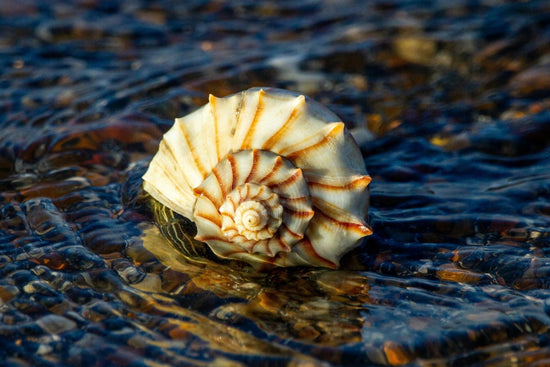Personal fragrances have been a part of our daily lives for thousands of years. We love perfumes for their ability to enhance our mood, transport us through time, and make a lasting impression as part of our signature scent. But have you ever wondered about what kind of ingredients we use to create perfumes, and how they might be impacting your body or the planet?
If you’re getting curious about the world of perfumes or are looking for guidance in making the switch to natural fragrances, we have created this page just for you. In this article:
Header image by Alessio Ferretti.
What Is Perfume?

Photo by William Bout.
In essence, a perfume is a blend of aromatic compounds that can be derived from plants, animals, or synthesized in a lab, which are used to apply a pleasant fragrance to one’s body. These compounds are commonly infused into a sprayable liquid, yet can also take the form of a scented oil or a hydrating balm.
Yet, considering the word’s etymology might expand our definition of perfume. From the Latin par, meaning “thorough,” and fumen or fumus, meaning “smoke,” the first perfumes refer rather to incense. This means perfumes might encompass a larger umbrella of aromatics that can be diffused throughout a space as well as around a person’s body.
Who Can Wear Perfume?

Personal fragrances are for everyone. Regardless of gender, wearing a signature scent can be a fun, empowering, and creative way to express yourself and your personal taste. We at Sea Witch Botanicals specifically focus on crafting unisex perfumes with natural, plant-based aromas anyone can enjoy. We believe wearing perfume can and should be a non-gendered experience!
It is important, however, to consider personal health factors such as respiratory sensitivity or fragrance allergies that may conflict with your body’s ability to metabolize a perfume. Please see your doctor if you have concerns for your health.
The History of Natural Perfumes

With a history extending as far back as 4000 to 7000 BCE, one thing about our love for fragrances is clear: As long as there has been civilization, there have been perfumes. While all perfumes were natural in ancient times, the rise of industrial manufacturing and modern technologies have made way for synthetic fragrances to revolutionize the world of perfumes—for better or for worse.
The earliest perfumes were incense and oils, with societies like Mesopotamia across the Middle East and Asia burning or anointing a rich variety of plants, woods, and resins during worship, therapy, or other rituals. Personal fragrance was also a luxury enjoyed by the ruling class in many places.
As recorded by Greek historian Plutarch (1st century CE), ancient Egyptian priests burned incense three times each day, offering frankincense and myrrh in the daytime and a special blend called Kyphi (a Greek transcription of the Egyptian word) in the evening. Kyphi, he wrote, is a “potion” or “salve” that might include honey, wine, raisins, aspalathus, seselis, bitumen, mastich, rush, sorrel, cardamom, and calamus.
Pharaohs like King Tutankhamun (1341–1323 BCE), seem to have been buried with scented oils or other fragrant cosmetics. Cleopatra, who lived more than 1000 years later, was famous for her sweetly spiced perfume—as romanticized by Shakespeare’s lines, “Purple the sails, and so perfumed, that the winds were love-sick with them” (Antony and Cleopatra, 1607).

Roman marbled glass piriform unguentarium (front and back) by Ancienttouch.com, CC BY 2.5.
Fragrances were also an important part of life for ancient Chinese royals, nobles, officials, and doctors. By 220 CE, “People applied the spices to incense clothes, purify rooms, prevent and treat epidemic diseases daily,” write Jie-yun Ding and Zhi-jun Jin for the Shanghai University of Traditional Chinese Medicine. Around the time of the Yuan Dynasty in the late 13th century, the institutionalized culture of fragrance made its way through the public.
Greece is renowned for the advancement of perfumery, often given credit for creating the first liquid perfumes intended to be worn on the body. Perfumes in Greece were in use by around 1400 BCE and were created by infusing oils with aromatic plants like oregano and myrrh, creating a thick paste. They were used for deity worship and personal fragrance alike.
Perhaps the most meaningful contribution to the development of perfume throughout history was born from the Golden Age of Islam (around 7th to 13th centuries CE). During this time, Islamic alchemists perfected the art of distillation, a process used for producing fragrances as well as essential oils. This is the technology that ultimately paved the path for the industrial manufacture of perfume.
Perfume production in Western Europe took off in the following centuries, giving us world-renowned alcohol-based perfumes like Eau de Toilette (5-15% fragrance concentration) and Eau de Cologne (2-4% fragrance concentration). After the turn of the twentieth century, lab-made synthetic chemicals entered the world of fragrances, making their debut in Chanel No. 5 in 1921.
Most perfumes ever since have included synthetic fragrances, causing the perfume industry to flourish. But we’re asking the question: Are synthetic perfumes really the healthiest choice to make?
Synthetic vs. Natural Perfume: Which is Better?
Synthetic perfumes are personal fragrances that include lab-produced fragrance chemicals, whereas natural perfumes exclusively use plant- or mineral-based, nature-derived ingredients. Both are guaranteed to provide the wearer with a lasting signature scent—so which should you choose to wear?
Is Synthetic Perfume Bad for You?

Photo by Emily Wang.
Synthetic fragrances aren’t entirely bad. They have a longer shelf life, offer a wider variety of possible scents, and are more cost-effective to make. Moreover, synthetic perfumes do not rely heavily on natural resources to produce their aromatics. Given the enormous and growing size of the perfume industry, this might help to protect the Earth from over-exploitation by perfumers.
That being said, concern around the safety of synthetic fragrances has been a topic of debate since their introduction. Some folks are quite sensitive to the artificial scents created for perfumes, while others can metabolize them easily. A larger body of research is needed in order to find definitive answers, but the available data strongly suggest that long-term exposure to synthetic fragrances can negatively impact human health.
According to the Environmental Working Group (EWG), a community of scientists, lawyers, and public health experts dedicated to environmental welfare, over 3,100 chemicals fall into the ingredient called “fragrance” or “parfum.” These compounds have varying effects on the body.
Some can disrupt the endocrine (hormone) and reproductive systems, or cause dermatitis, allergic reactions, headaches, or respiratory irritation. Some chemicals, like styrene, are even linked to cancer.
Moreover, synthetic fragrances can negatively impact the environment. When entering the ground or waterways through waste, these unnatural fragrance chemicals can disrupt soil health and aquatic ecosystems, posing a major threat to biodiversity.
Some chemicals containing phosphates can cause massive freshwater algae blooms that consume all oxygen available for life in the waterway. Others can alter the water’s surface tension, which makes it easier for toxins like pesticides to enter the stream and be absorbed into the food web. A majority of synthetic fragrances are also derived from fossil fuel resources like petroleum and coal tar, making them fundamentally unsustainable ingredients.
Why Use Natural Perfume?

On the other hand, natural perfumes generally do not tend to show any perverse effects on our health. Commonly produced from essential oils, alcohol tinctures, resins, and other plant extracts, these nature-based fragrances typically do not cause skin or respiratory irritation, test on animals, or contain pesticides or chemical toxins.
In fact, many believe natural perfumes might even benefit the human body given the healing properties contained within the plants they’re made from. While aromatherapy lacks the vetting of Western science, plants have been the basis of medicine around the world for thousands of years. Their benefits can be absorbed directly through the skin when applied as a solid perfume; when inhaled, extracts like essential oils can at the very least improve emotional wellbeing.
Yet, even plant-based aromas can be overwhelming for some, especially if you have an allergy to one of the ingredients used in the fragrance blend. Given the reliance on natural resources and human labor to produce these scents, it’s also important to purchase natural perfumes from conscientious companies that source ethically produced, fairly traded ingredients to craft their products.
At the end of the day, every body is different. Choosing a fragrance comes down to your own taste and sensitivity. We urge you to make use of the available data about fragrance ingredients, as we all have a responsibility to our health to be aware of what we invite into our bodies.
For more information, check out our toxic ingredients blog post, or explore EWG’s Skin Deep cosmetic database.
Types of Natural Perfumes
Natural perfumes tend to come in three main forms: perfumed oils, scented spray perfumes, and solid perfume balms. Each is an effective way to apply fragrance to your person—some might have a more concentrated scent while others might travel better. It all comes down to your desired experience.
Perfumed Oils

Perfumed oils blend a rich selection of plant oils for direct application to the skin. Some may be pure essential oils or plant-derived fragrances. Others might be cut with a carrier oil, such as castor oil, rice bran oil, or grapeseed oil, which may serve to dilute or preserve the scent, hydrate the skin, or prevent irritation. You’ll likely find perfumed oils in a roll-on bottle, or in a vial with a dropper to massage into your skin.
Spray Perfumes

Spray perfumes combine all-natural fragrances with water and natural preservatives and diffuse their scent as a fine mist through an atomizer top. Walk through a spritz or two of your favorite aroma and you’ll wear it all day! At Sea Witch Botanicals, our one-of-a-kind scented veils are formulated with witch hazel, essential oils, plant extracts, natural alcohol, and water. They are versatile enough to be used as a body spray, yoga spray, linen spray, and room spray!
Scroll to the end of this page to peruse our best-selling scented veil sprays, or find our full catalog here.
Solid Perfumes

Solid perfumes mix essential oils or plant-derived fragrances with natural oils and waxes to create a scented balm that can be massaged into the skin. At Sea Witch Botanicals, we handcraft our solid perfumes with a hydrating blend of candelilla wax, organic coconut oil, and non-GMO grapeseed oil, together with Vitamin E-rich cocoa butter and anti-inflammatory, antioxidant shea butter (both ingredients organic and fairly traded).
Scroll to the end of this page to peruse our best-selling solid perfumes, or find our full catalog here.
Are Natural Perfumes Safe for Pets?

The short answer: It depends on the types of ingredients used, how the scent is applied, and what kinds of animals you live with. Animal senses are far more delicate than our own, and different plants will not impact all animals in the same ways. If you’re interested in using a natural perfume while sharing your home with a pet, make sure to read up on which plants are toxic to them, as well as how to recognize potential signs of toxicity or poisoning.
A general rule of thumb to follow when it comes to natural perfumes and pets is to opt for a solid perfume or scented oil. A spray containing potentially harmful ingredients to your animal will be diffused in tiny droplets across every surface in the area, which your pet risks ingesting by licking the surface or rolling around on the surface and then grooming themselves. When using a perfumed balm or oil, make sure your animal does not lick or come into contact with the area where the perfume has been applied.
It is also worth noting that, while research into this topic remains relatively scarce, synthetic fragrances are likely harmful to animal health as well. Given the pervasiveness of fragrance chemicals we already know to be toxic to human health, such as parabens, phthalates, formaldehyde, synthetic musks, and thousands more, learning about these chemicals’ effects on animals is just as important as investigating the positive and negative impacts of essential oils on animal health.
Click here to learn more about safely using essential oils or scented products around pets. If you have concerns for your animal’s wellbeing, please contact your veterinarian or an emergency pet helpline.
Best-Selling Natural Perfumes by Sea Witch Botanicals

Our founder and master crafter, Alesia, has been infatuated with fragrances all her life, and learned how to produce them using exclusively nature-derived, environmentally-friendly ingredients. From incense and candles to wearable perfumes, synthetic-free aromas are our specialty!
Essential Oil Scented Veil Sprays
Craft an aura of your own with just a spritz or two of our signature scented veils. Hand-poured into a four-ounce reusable amber glass bottle and secured with an atomizer top, these refreshing hydrosols produce a fine mist ideal for perfume application.
Yet, these self-care staples don’t stop at perfume: Each scented veil is a multifunctional tool. Wear as a personal fragrance, spray to freshen your room, shoes, or car, or use for a plethora of other practical magic purposes—from cleansing and setting daily intentions to keeping spiders away.
Our collection of Sea Witch classic scents are available all year-round, while our seasonal scented veils are only available for a limited time. Be sure to check our current offerings for a special deal!

Hermitage, a sweet, intimate blend of patchouli, lavender, & citrus.

Krampus, a sinister winter aroma of frosted pines & holiday spice.

Herbal Renewal, an invigorating, floral blend of lavender & rosemary.

Mabon, a cozy fall aroma of coffee, vanilla, bergamot, & spices.

White Lodge, a clarifying, grounding blend of cedarwood & fir needle.

Quoth the Raven, a zesty, energetic blend of orange, cinnamon, & clove.
All-Natural Solid Perfumes
Compact and discreet, our solid perfumes are hand-poured with love into one-ounce reusable or recyclable aluminum tins, and sealed with a compostable sticker. To apply, simply scrape a small amount of the mixture with your fingernail or another applicator, and apply to wrists and behind the ears.
Each scent is infused with its own unique mixture of essential oils, providing an array of health benefits and metaphysical properties. Use Herbal Renewal’s classic blend of lavender and rosemary to calm your nerves and clear your mind, or slip into an enchanted realm with our Tolkien-inspired trio.

Hermitage, a sweet, intimate blend of patchouli, lavender, & citrus.

Night Nymph, a sultry, sensual blend of rosemary, fir, patchouli, & clove.

Quoth the Raven, a zesty, energetic blend of orange, cinnamon, & clove.

Herbal Renewal, an invigorating, floral blend of lavender & rosemary.

White Lodge, a clarifying, grounding blend of cedarwood & fir needle.

Fae Ring, a fruity, frolicsome blend of ylang ylang, patchouli, & citrus.





